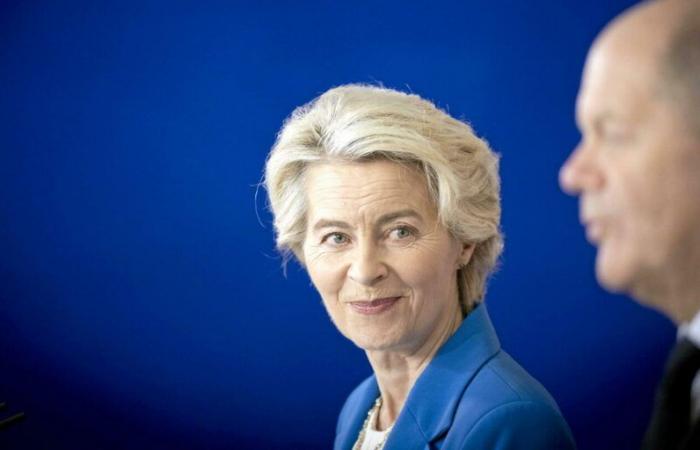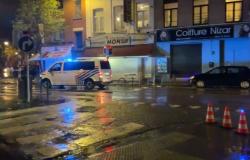Lhe first reactions in Europe to the fall of Bashar Al-Assad's regime oscillate between relief and concern. Relief at the end of a bloody dictatorship but concern about the future of a fractured country. Germany, on the front line of welcoming Syrian refugees, reacted seriously. “Good news” welcomed by Chancellor Olaf Scholz. “Assad brutally repressed his own people, caused countless deaths and pushed millions of Syrians to flee their country,” he recalled, emphasizing the urgency of reestablishing “law and justice” in Syria.
The number of people of Syrian origin, including those with German nationality, was estimated at around 1,281,000 in 2023. In addition, the population of Syrian nationality residing in Germany amounts to 972,460 in 2023, making it makes it the second largest group of foreign nationals living in the country.
Foreign Minister Annalena Baerbock maintained this tone. “The end of Assad means for millions of Syrians a first great relief after an eternity of terror under his regime,” she says. Assad has killed, tortured and used chemical weapons against his own population. » The head of German diplomacy also warned of the risk of chaos. “The country must not fall into the hands of other radicals, no matter what they look like,” she worries. She called for protecting ethnic and religious minorities, such as Kurds, Alawites and Christians, and for an inclusive political process.
Antonio Tajani: Italian prudence in the face of uncertainty
Many fear a Libyan-style scenario which would bring no stability to the already explosive region. According to the UNHCR, Turkey hosts 3.76 million Syrian refugees, the largest number in the world, while 1.9 million Syrians are registered in Egypt, Iraq, Jordan and Lebanon.
The Pole Donald Tusk is the only one, to date, to make the link between Syria and Ukraine. According to him, “events in Syria” should make it clear that “even the cruelest regime can fall and that Russia and its allies can be defeated.”
In Italy, the head of diplomacy, Antonio Tajani, held a detailed press conference on Sunday marked by particular attention to the security of Italian nationals in Syria. “We had an emergency meeting with all the Italian ambassadors present in the region, starting with the one in Damascus, but also with our ambassadors in Russia and Turkey, for a general assessment of the situation,” he said. he explained.
A call for protection of Christians in Syria
The head of Italian diplomacy revealed that an armed group had entered the garden of the residence of the Italian ambassador in Damascus. “There was no violence against the ambassador or the carabinieri. They only took three cars,” he explained. He added that Italian diplomats now work “safely, outside the residence, and remotely.” Concerning the Italian citizens, Antonio Tajani specified that a group of fifteen people had been able to cross the Syrian border to reach Lebanon, thanks to the help of the Italian embassy in Beirut. “Everyone is now safe,” he assured.
On the political level, the Italian Minister of Foreign Affairs is pleading for a peaceful transition. Like Analena Baerbock, he also insisted on the need to protect minorities, particularly Christians, and to preserve the political unity of Syria. “The Christian presence in the Middle East is not only the defense of a minority, but also a factor of stability and balance in the region,” he concluded.
European institutions: between opportunity and vigilance
On the side of European institutions, reactions highlighted the opportunities offered by the fall of Assad, while highlighting the challenges to come. Kaja Kallas, the new High Representative of the EU, welcomed “the end of a cruel and long-feared dictatorship”, while noting that it revealed “the weakness of Assad's supporters, notably Russia and Iran “. She stressed the need to guarantee regional security and called for constructive engagement to rebuild Syria. “The process will be long and complicated,” she warned.
Antonio Costa, President of the European Council, adopted a more optimistic tone, seeing this event as a historic opportunity. “The Assad dictatorship has caused immense suffering. With its end, a new chance for freedom and peace emerges for the Syrian people,” he believes.
Antonio Costa also reaffirmed the EU's commitment to working with Syrians to build a better future. Finally, Ursula von der Leyen, the president of the European Commission, speaks of a “historic change”. Like Antonio Costa, Ursula von der Leyen assured that Europe was ready to support the reconstruction of an inclusive Syrian state, guaranteeing the protection of minorities and national unity.
Donald Trump doesn't want to get involved
The fall of Assad marks a major turning point for Syria and the region. But it also poses immense challenges for Europe, which will have to combine humanitarian aid, support for reconstruction and management of migratory flows. If Germany has shown the way by welcoming more than a million refugees, the European response will have to be collective and coordinated.
To Discover
Kangaroo of the day
Answer
As Antonio Tajani pointed out, “the situation in Syria is in constant flux”. One question remains unanswered: what attitude will Vladimir Putin adopt in the region? Donald Trump, for his part, did not wait to know which side Syria is heading to adopt a clear-cut and isolationist position.
In a statement with a characteristic tone on X, the new American president insisted on the weakening of Russia, which he attributes to its losses in Ukraine. “Russia, with the loss of more than 600,000 troops in Ukraine, appears incapable of stopping this literal march through Syria. He concluded forcefully: “Syria is a disaster, but it is not our friend, and the United States should have nothing to do with it.” This is not our fight. Let them sort themselves out, don't get involved! »






